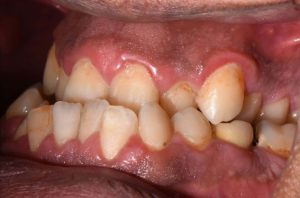
Inflammation and toothache – CBD as an analgesic and anti-inflammatory agent
Inflammation of the tooth is a natural defense reaction of the body, which wants to restore itself in this way. However, this affliction is accompanied by hypersensitivity and severe pain. Untreated inflammation can even lead to the need to remove a tooth, so people who feel severe pain should seek dental consultation. However, what can be done to temporarily alleviate such discomfort? Traditional pharmaceuticals can sometimes be supported naturally. One of them is CBD oil. Find out how it can help fight inflammation.
What is tooth inflammation and what are its causes?
Dental inflammation occurs in the pulp, the tissue that fills the tooth chambers and roots. It has a gelatinous consistency and is highly innervated, which translates into its high sensitivity. This tissue is responsible for oxygenating the teeth and providing them with the necessary nutrients. This is where tooth inflammation and accompanying pain begin.
The main cause of tooth inflammation is most often untreated tooth decay. Less often it occurs due to external factors (overexertion, mishandling or overloading). In the initial stage of inflammation, the patient feels pain only when eating and drinking cold or hot food. With irreversible inflammation of the dental pulp, the pain is experienced in a sudden manner (sometimes it can be accompanied by severe jaw pain and fever).
CBD oil for tooth inflammation
Toothache is very acute, so patients are looking for ways to help relieve it even before they can completely treat the inflammation at the dentist’s office. The inflammation process involves immune cells and many cell mediators. The functioning of the tissue is then disturbed, pain, redness and swelling appear, and often the body temperature also rises.
Current research shows that CBD 5% oil has antioxidant and anti-inflammatory effects. The cannabinoids in it affect CB1 and CB2 receptors. They are G-protein-coupled receptors and are stimulated by endogenous and exogenous ligands. CBD, on the other hand, is an exogenous cannabinoid (as it is supplied to our body from outside). CB2 receptors are important for the inflammatory process. These occur m.In. Within fibroblasts (connective tissue cells) and on cartilage and bone tissue cells.

The presence of CB2 receptors on the surface of mast cells (mast cells) of the immune system is important. They are responsible for innate immunity and are involved in m.In. in the inflammatory process. CBD oil reduces the production of interleukin 2 and interferon gamma. Recent studies suggest that it may inhibit the function of T lymphocytes, which in the human body are responsible for the cellular response of the immune system.
CBD oil – a natural substitute for anti-inflammatory drugs
Anti-inflammatory drugs most often produce effects during long-term use. At the same time, non-steroidal anti-inflammatory drugs NSAIDs can affect gastric mucosal damage. Cannabinoids stimulate CB2 receptors, have anti-inflammatory and analgesic effects, while having no adverse side effects. This makes CBD oil suitable for ad hoc use for toothache and inflammation.


